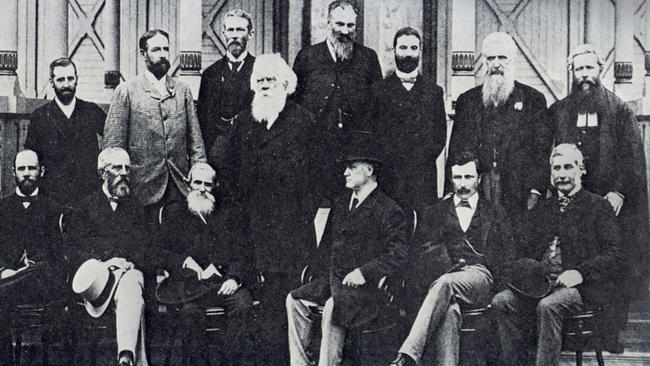Talking Point: Federation’s father Andrew Inglis Clark deserves a nod
BOB HOLDERNESS-RODDAM: It is time for the seat of Denison to be renamed to recognise Andrew Inglis Clark.

Opinion
Don't miss out on the headlines from Opinion. Followed categories will be added to My News.
THE redistribution of federal electorate boundaries in Tasmania is now well under way. This is a multistage process, with the first two already completed — public suggestions for boundary adjustments, and public comments on the initial suggestions.
The main purpose of these regular, seven or eight yearly, redistributions is to adjust electoral boundaries to ensure that electorate numbers are fairly evenly matched. However, it also gives an opportunity to propose name changes to electorates.
Two of Tasmania’s five electorates have already had their names changed from their original names from 1903. These were Darwin, renamed Braddon in 1955; and Wilmot, renamed Lyons in 1984.
There were 21 submissions to the redistribution committee in the first round of public suggestions. Of these, 15 addressed the proposal to change the name of Denison to either Clark, or to Inglis Clark. Only four submissions favoured the retention of Denison.
A most eloquent submission in support of renaming Denison came from the former Justice of the High Court of Australia Michael Kirby.
MORE: JUDGES PUSH DENISON NAME CHANGE
“Andrew Inglis Clark is undoubtedly one of the most important of the Founders of the Australian Commonwealth,” he wrote.
“He was himself a distinguished member of the Tasmania Colonial and State Parliament and Attorney-General for the State. He later served on the Supreme Court of Tasmania and came close to appointment [to the High Court of Australia]. …
“Whereas the other chief contributors to our federal constitution (Griffith, Barton, Deakin, Reid, Kingston and Isaacs honoured in the names of federal electorates) somehow Andrew Inglis Clark has missed out on his just recognition in his home State of Tasmania.
“This is unjust and undeserved. When a comparison is made between the text of the Australian Constitution that emerged from more than a decade of deliberations and conventions, and the draft that was first presented by Clark, the enormous impact of Clark’s conception, drafting style and choice of contents can instantly be seen.”
Other high-profile supporters of the proposed change from Denison to either Clark or to Inglis Clark include the current federal member for Denison, Andrew Wilkie, and Justice Duncan Kerr, the previous federal member for Denison.
Two submissions, those of Rodney Croome and myself, provided further evidence of wide community support for the name change.
Mr Croome’s submission included 221 signatures from an online petition at Change.org.
These were not confined to Tasmania, with support coming from interstate and even New Zealand. Fifty made further comments, citing their reasons for signing the petition.
My own submission included a petition with 42 signatures in support (with another 39 added at the comment stage) and 10 supporting statements from a range of individuals.
These include former Federal Court justice Peter Heerey, Professor George Williams, former House of Assembly speaker Andrew Lohrey and Senator Lisa Singh — a former state minister and former member for Denison.
It is a reproach to our sense of history that Inglis Clark has not been more widely recognised and his name honoured.
No less a person than the former Chief Justice of the High Court of Australia Sir Gerard Brennan had this to say in a supporting letter to me in 2008: “Clark was the architect of the principal provisions of our Constitution which melded the institution of responsible government with the American Federal Pattern. He had the insight to ensure that Australia should become a single law area by insisting on the general jurisdiction of the High Court of Australia to hear appeals from both state and federal courts.
“Inglis Clark’s contribution as a founder of federation has not been recognised comparably with the recognition given to Barton, Deakin, Griffith, Kingston, Parkes, Isaacs or Higgins.
“It is a reproach to our sense of history that Inglis Clark has not been more widely recognised and his name honoured.”
Just four submissions favoured the retention of Denison as the electorate name — but three of the authors made subsequent comments that qualified their opposition.
The State Liberal Party submission stated that it did not recommend any changes to existing divisions, a position at odds with several former and current Liberal members of Parliament. Examples include Sir Max Bingham who said in 2008: “I wholeheartedly support your proposal. Clark was really a great Tasmanian, and an important Australian. I would be delighted to see my old electorate named after him.”
Similarly, the late Neil Robson, who was responsible for introducing the Robson rotating ballot paper for Tasmanian elections, said “I support your stand. Clark was a Tasmanian, a member of the Tasmanian Parliament.
“A known electoral reformer and what he was supporting was the best electoral system in the world bar none.”
More recently state minister Matthew Groom strongly supported the change to Inglis Clark in a statement to the House of Assembly on 21 September last year: “It is my view that Andrew Inglis Clark is a person who has made one of the most significant contributions to the national political life of Australia from Tasmania.
“His contribution has not been appropriately acknowledged and I think it appropriate that we give consideration to this suggestion.
“By any assessment, Clark’s contribution to both Tasmania and the nation has been truly extraordinary. It is in this context that I support the case for the renaming of the federal and state electorate of Denison, the electorate that I represent, to Inglis Clark.”
It is long overdue to recognise Tasmania’s role in developing our Constitution. We must not allow ourselves to be left off the map of Australia yet again.
Bob Holderness-Roddam has had a longstanding regard for the legacy of Andrew Inglis Clark since encountering the Hare-Clark electoral system upon his arrival in Tasmania in 1966.


